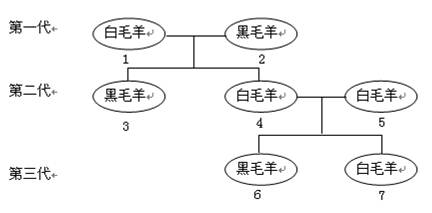问题
实验题
羊的白毛和黑毛是一对相对性状.如图是羊的毛色遗传的图解.请据图回答:

(1)确定白毛和黑毛这对相对性状显、隐性关系的依据是
(2)若用H表示显性基因,h表示隐性基因,则黑毛羊2的基因组成是
答案
第二代4、5都是白毛羊,而第三代出现了6黑毛羊 hh
题目分析:(1)由图中的第二代4和5都是白毛羊,子代是出现了黑毛羊,说明白毛羊是显性,黑毛羊是隐性性状,即无中生有为隐性。(2)若用H表示显性基因,h表示隐性基因,两个隐性基因同时存在时,表现隐性性状,即黑毛羊2的基因组成是hh。
